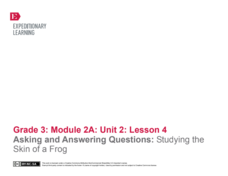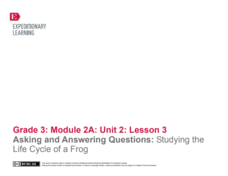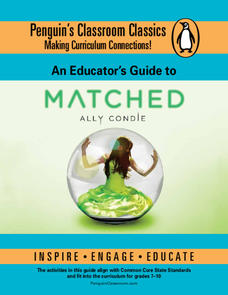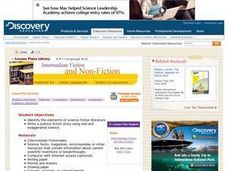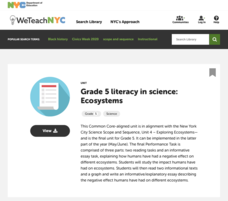Curated OER
Phineas Gage: Questioning Strategy
Focus on chapter two of Phineas Gage: A Gruesome but True Story About Brain Science with a questioning activity. After teaching and modeling several types of questions, learners work with partners and then independently to answer and...
University of North Carolina
Political Science
The right to vote and freedom of expression are democratic principles that fall under the study of political science. A handout describes writing assignments that are common in political science college classes and gives tips and...
EngageNY
Science Talk: How do Bullfrogs Survive
Following the reading of the book Bullfrog at Magnolia Circle, the ninth activity in this unit involves emerging experts in a science talk about how bullfrogs survive. Looking back through the text, young scholars prepare for the...
EngageNY
Asking and Answering Questions: Studying the Skin of a Frog
English language arts and science combine in a lesson that focuses on asking and answering questions about frog skin. Discussion, a read-aloud, and partner work lead the way towards a three-page worksheet that tests learners'...
EngageNY
Asking and Answering Questions: Studying the Life Cycle of a Frog
A lesson challenges learners to ask and answer questions about the life cycle of a frog. With a class read-aloud, partner discussion, and notebook reflections, scholars complete a three-page worksheet to prove their understanding of the...
Michigan State University
Interviewing
Do you have pests at your school? Find out through a series of interviews with school personnel. Scholars visit a variety of knowledgable individuals to ask them questions, record their answers, and present their findings to their...
Curated OER
Comprehending Through Questioning
Elementary schoolers observe and apply a variety of reading comprehension strategies. They silently read a passage out of their science textbook, and discuss answering the who, what, where, when, and how of the text. In small groups they...
Curated OER
Shizuko’s Daughter: Question Answer Relationships
Asking questions about what you're reading is an effective way to connect with the text. After kids read passages from Kyoko Mori's Shizuko's Daughter, they identify questions about the passages as Right There, Think and...
EngageNY
Making Inferences About Informational Text: Science Talk on How My Insect Contributes to the Rainforest Ecosystem
We need to talk. Learners participate in a science talk by discussing the idea of how insects are important to the rainforest. They record notes about their conversations as they talk. For homework, pupils add to their field journals.
Penguin Books
An Educator's Guide to Matched by Ally Condie
Even supposed Utopian societies have their flaws. Using an educator's guide, individuals explore the society Ally Condie creates in Matched. Reflective writing prompts double as discussion questions and cover key themes in the novel, as...
Scholastic
Lesson Two: The Earth, Introductory Activities
Determine what young pupils already know about earth science with a brainstorming activity. After class members work together to complete a KWL chart about the Earth, they craft an acrostic poem to demonstrate their understanding.
Smithsonian Institution
Water/Ways: The Poetry of Science
Water is the source of life. It appears in poetry in both peaceful and torrential descriptions; it appears in earth science in its liquid, gaseous, and solid states. Combine these interpretations of our planet's most precious and...
Curated OER
Science Fiction Literature
Students identify the elements of science fiction literature. They write and illustrate a science fiction story using real and exaggerated science. In addition, they read their stories aloud in small groups.
Channel Islands Film
Arlington Springs Man: Lesson Plan 1
Learning to craft quality questions is a skill that can be taught. Class members use the Question Formulation Technique to learn how to create and refine both closed-ended and open-ended questions. They then view West of the West's...
Curated OER
Science Fiction Stories
Learners write a story. In this genre lesson, students read a science fiction story and discuss its characteristics. Learners brainstorm a list of things that if scientifically changed would alter the way we live our lives. Students...
New York City Department of Education
Grade 5 Literacy in Science: Ecosytems
How do humans affect ecosystems? Learners read two articles and interpret a graph to develop essays on the human impact on ecosystems. They read about human impact on tigers and manatees as a basis for their overarching papers.
Curated OER
Environment: Clouds of Changing Times
Here is a wonderful lesson which has youngsters interview family and local elders about the seasonal history of their local area. They focus on climate change by asking questions about rainfall, temperatures, length of the seasons, and...
Curated OER
Round-Robin Reading Quiz
Small groups of learners read text round-robin style, and then work individually to answer three questions based on the text. Next, they share their questions and responses and add ideas from the group. The reading strategies detailed...
University of North Carolina
Anthropology
Anthropologists ask the question that everyone wants answered: what does it mean to be human? An online handout provides a brief introduction to the study of anthropology and outlines three common types of anthropology writing...
Curated OER
Working with Questions
Students explore questions in a scientific context. They consider what makes questions testable. After reading short scenarios, students come up with their own testable questions about the reading.
Curated OER
Science Vocabulary
Students examine Science in present day life. In this oral communication lesson, students discuss and rank scientific events from least to most important. Students discuss their responses and why they are different....
PBS
Frankenstein: The Consequence of Creation
Famous as a horror story, as the first science fiction novel, Frankenstein is also a tale of ambition, a warning about unbridled science, and responsibility for actions. Readers consider what the tale says of the consequences of creation...
EngageNY
End of Unit Assessment Part II: Science Talk
Scholars complete Part 2 of their end of unit assessment by having a science talk. Pupils pair up to answer questions about what makes a natural disaster. As one learner talks, the other records what is said. They then trade places.
Curated OER
Investigate Science Using Crayfish
Young scientists discover the importance of scientific investigation by observing live crayfish. They carefully observe the patterns of crayfish in different environments. Then they discuss their conclusions and define what all living...



